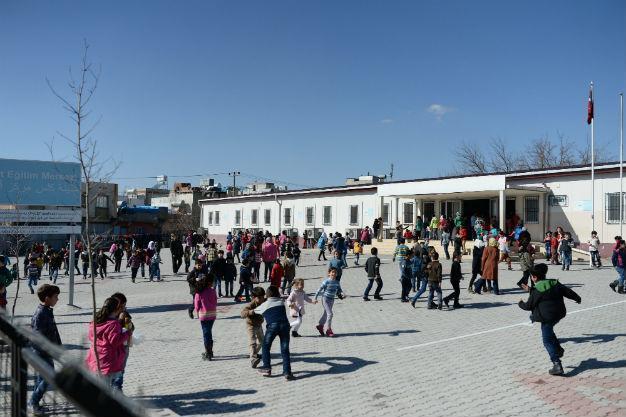Living with Syrian refugees in Turkey’s Kilis
Gülden Aydın – KİLİS

HÜRRİYET photo
Unlike many Turkish provinces that have received Syrian refugees in large numbers, one hardly sees child beggars on the streets of Kilis in Turkey’s south, as the governorate exerted effort to school minors.
There are around 30,000 Syrian children of elementary and middle school age in downtown Kilis. Seventy-five percent of them are going to temporary education centers - special schools designated for Syrian migrants living in Turkey - according to the provincial directorate of education.
This percentage, however, drops to 7 percent for the high-school-aged Syrians as young boys usually start working and girls are married at those ages.
Kilis’ crime rate is far below Turkey and Europe averages, Kilis Mayor Hasan Kara told Hürriyet, adding that contrary to projections, there had not been any social traumas or large scale crimes related to the town’s rising Syrian population.
However, according to Kara and other residents, Syrians have brought about problems too.
“We share our streets, water, green areas and sewage with them. This brings about some serious problems. A Syrian family dumps three times as much garbage as a Turkish family; they consume also three times more water. We receive huge support from the [Turkish] president, the prime minister and the cabinet but even the burden Hercules can shoulder has a limit,” Kara said, complaining about the lack of support from the U.N., E.U. and Arab countries. “We do not get along with Syrians. Our cultures, customs and languages are way different from each other. Our lives are very different. But we are showing a hospitality that has not been witnessed before,” Kara said. “Even if you plant mines around Kilis or Turkey, these people would want to go to Europe as long as we do not improve their life standards. But Kilis has done enough. Europe should share this burden on our shoulders,” said Kara.
The women of Kilis also have one major problem with Syrians: some husbands marry second or third wives from women among the Syrian community in the southeastern town.
Under the Turkish Civil Code, men cannot marry more than one woman but Islamic law allows men to have multiple marriages.
In Syria, men can legally marry up to four women and the legal age for marriage is 17. Kara said the practice was “wrong but unfortunately, in place.”
“We try to manage the process correctly as we possibly can,” he said.
A woman named Filiz, from Kilis’ Atatürk neighborhood said that she was fed up with her husband saying “Go if you want, I can easily find a Syrian” after every dispute. She also said her brother -married with two children- took a 15-year-old Syrian girl as another wife.
Another woman named Emine Taşçı from Beşyüz Evler neighborhood said her neighbor’s husband, who is legally married, also married two Syrian wives.
“This can happen to me, too; they are stealing our jobs, our food and now our spouses,” she added.
“Elderly men from cities like Ankara and Samsun come and buy rings, bracelets and pairs of earrings,” said Ali Çalışkan, a jewelry store owner in Kilis.
Elderly men buy jewelry to be given to the families of young Syrians girls in return for the hand in marriage of their daughters.
Meanwhile, Syrian refugees have not led to any security problems, according to Kilis Governor Süleyman Tapsız.
“All the police-related incidents stem from minor conflicts between them,” he told Hürriyet referring to the Syrian residents.
“Since the beginning of the migration period, we have had a communicative approach to alleviate small conflicts that may occur. We have informed NGOs, businessmen, civil servants and citizens of Kilis regularly [about the issue],” he said.
“We are not going to bring Syrians [currently] waiting on the border at Kilis. Ankara knows that Syrians outnumber us in Kilis,” he added.
